It is a strange thing to firmly belong to a land that only tentatively and ambiguously belongs to you. It is a strange thing to be deeply rooted in the place your wandering ancestors happened to land a few generations ago. It is a strange thing to feel intimately bound to a piece of earth you no longer depend upon to sustain you. It is a strange thing to be an Oklahoman.
Like many Southerners, I can trace a significant strand of my roots to the Scots-Irish immigrants who spread out from Pennsylvania, down through Appalachia, and west into Oklahoma and Texas. Thus, I come from a somewhat rootless people. Though they would have often been described as “settlers,” they were a people known more for their movement than for their settlement: from Scotland to Ireland; from Ireland to America; from the north to the south; from the south to the west. Their story is told well in Jim Web’s book Born Fighting. They were Protestant dissenters looking for a place to worship as they saw fit. Then they were the poor and fiercely independent looking for a place where they could live free. They were a strong and often skilled group of people, but they were also a people habitually “up against it” and looking for a place to scrap together a better life.
This search for something better led my maternal forebearers into Oklahoma sometime in the late 19th century, where they settled in the hills just west of the Arkansas border, part of a small western outpost of Appalachia. Both of my maternal grandparents were born there, and I have family ties there still. Following the oil fields, however, eventually brought my grandparents to central Oklahoma, where my mother graduated high school, I graduated high school, and—just this past May—my oldest daughter also graduated high school. Religion, opportunity, and oil brought me to this place. A lifetime spent here has bound me to it.
Most of Oklahoma can still be described as rural. None of my grandparents was a full-time farmer in adulthood, but they still carried the memories, habits, and practices of a people living by the land. They were rural people. They raised cattle and grew vegetables to supplement the income earned from other work. They lived through the Great Depression in Oklahoma, so they knew how to survive. Remarkably, while so many packed up and continued the great Scots-Irish migration west, my grandparents did not, likely because none of them was living in the panhandle where the dust was the worst. Or perhaps something in their wandering DNA finally gave out, and it just seemed better to stay for once. For whatever reason, they finally stuck. And now I am stuck too. Or rather, I’m choosing to stick.
I live in the town in which I grew up, the town I have always lived in with the exception of the few years I spent on higher education elsewhere. So, to put that numerically, I have lived in Chandler, OK, for thirty-six of my forty-eight years: the first eighteen years and the last eighteen years so far. I have done so because I have chosen to do so. My wife and I have made this choice together, to return to and spend the rest of our lives in the town in which we grew up, met, and fell in love. This choice has not been without practical considerations. It is useful to have family nearby to provide childcare from time to time, and it is reassuring to have a general support network should we need it. Also, it is nice to live in a place with a reasonable cost of living, which has afforded us a more comfortable lifestyle and a greater amount of security than we would likely have most other places. The bulk of our decision, however, has not been practical but rather more spiritual in nature. In short, we want to belong to a place. We want to live a life together in acknowledgement that our life is not of our own making. And, since this is the place with a prior claim to us both, this is the place we have stuck.
Yet, while Oklahoma’s claim on me is strong, I know that, from one way of looking at it, my claim on Oklahoma is substantially weaker. The poor Scots-Irish settlers who flooded into Oklahoma before and after it was officially opened may not have been the ones calling the shots in their nation’s treatment of its native population, but they were the seemingly unstoppable force that swept into the southern plains and pushed aside the previous inhabitants as irresistibly as their own ancient relatives were swept aside by the Germanic waves that crashed into the British isles in the early Middle Ages. No more than three or four generations before me, this land was taken from one people and appropriated by another people. The later people, the takers, were my people.
The place where I live was opened to white settlement in a second land run shortly after the famous Oklahoma land run of 1891, apparently because the survey was not finished in time for the big run. When I was a child, this land run was commemorated yearly by school children dressed as pioneers. I vividly remember taking my turn as an original settler of the Chandler area. Like most of the boys in my class, I somewhat anachronistically insisted on dressing more like a movie cowboy than a pioneer. Fortunately, small boys in Oklahoma are accustomed to running in stiff, knobby-heeled cowboy boots. They gave us plastic tent stakes and sent us running across an empty field adjacent to the city park, so that we could stake out a little claim for ourselves. We then celebrated with sack lunches and games. Years later, my own children went through this yearly ritual, and, as far as I know, Chandler kids are still running for little plots of Oklahoma earth today.
The story of Oklahoma settlement is, of course, much more complex and complicated than any elementary school field day can capture, but I believe the impulse to remember, even to re-enact, is correct. Correct too are the various efforts of the tribes that have occupied and still occupy this land to remember their story. The Sac and Fox and Iowa tribes were relocated only a few decades before the land run to the former Osage hunting ground that would eventually become Lincoln County, OK. The new white settlement did not straightforwardly replace the recent tribal settlement but, rather, overlaid it. The result is layers of culture, a far more complicated and interesting story than the dominant myth of simple replacement. When urban dwellers elsewhere dismiss Oklahoma as “lacking diversity,” I like to point out that I drive through several sovereign territories on my way to work. To whom does the land belong? Are our field-day commemorations really claims of ultimate ownership, a way of marking the land “ours”? Or are they the fragmented pieces of a whole picture that is hard to see from where any of us stand, which is on the land in question itself?
It is hard to say who this land belongs to, but I know without a doubt that I belonged to it from my earliest youth. I was raised just south of town, on a defunct dairy farm surrounded by miles of pasture and scrubby woods. I can barely remember a time before I was allowed to roam over that countryside freely. As long as we didn’t interfere with the cattle, the ranchers who lived around us didn’t mind if my sisters and I fished in their ponds and played in their woods. From eight-years old on, I was adept at moving over, under, or through a barbwire fence. I knew which of the houses scattered along the dirt roads had dogs that should not be approached. I know where the clumps of scrub oak and invasive eastern cedar would give out into open field, where erosion created gullies suitable for trench warfare, and where little creeks populated with crawdads lazily slumped into swampish ponds thick with tadpoles and bullfrogs. I knew when the hay was cut, baled, and hauled under the relentless heat of the sun. I came to know the rhythms of the year in this particular place. I became accustomed to seeing the sky from here.
Soon I added to this connection to the countryside a close coexistence with the town itself. Many of the businesses I frequent today are places I accompanied my parents or grandparents to when I was a child. Other shops have been started by people I have known for years and perhaps even grown up with. Not that our streets haven’t changed. Businesses have, of course, come and gone, but I feel all the more bound to this place by the experience of the change, by being part of a living community neither fossilized nor completely discontinuous with the past. The neighborhoods around town both are and are not the same as in my boyhood. Some houses are unchanged; others are gone. Some houses have fallen into dilapidation; others have been renovated. Trees have grown larger, been cut down, or been trimmed back. All of this has happened mostly before my eyes.
I don’t have a much better reason than that for being here. I’m a professor and a writer, work that could be done just about anywhere, perhaps with greater ease than it can be done among my admittedly often anti-intellectual rural brethren. My wife’s family is still mostly in the area, which is no doubt a very good reason for us to be here, but all of my immediate family, and most of my relatives, have passed away or moved away. Maybe, in part, I’m here as a last foothold for my clan. Or maybe I’m just here for sentimental reasons. But I think it is more than that. I think I am here because a decision to stick has to be made at some point and because, no matter how bloody and unjust the history of a place may be, there is no sense in simply running from the past. Even in America, someone has to answer the call to dwell in the complexity of history.
It might seem strange to love a place merely for long association with it, but most of our loves are formed that way. That this long association begins in accident, both historical and familial, is no mark against it. Most of our meaningful connections are not of our own making. We are given to a place through the apparent accidents of birth, though with faith we may sense the hand of providence behind it all.
In “The Gift Outright,” Robert Frost succinctly sums up early American experience by noting that “The land was ours before we were the land’s.” I suspect such was the case for much longer among the restless Scots-Irish and further west than Frost’s beloved New England. But it is important to note that the “gift” in the title is not the land. The gift is ourselves. Frost presents this gift of self to place as a deliberate act: “Such as we were we gave ourselves outright.” Living with the ambiguities and contradictions, I deliberately make this gift of myself, such as I am, in hopes that it will also be a gift of my children and for my children. Although I will not attempt to constrain them, I hope my children and their children will accept the gift and accept being given, by the chances of their births, to this place. To sustain the sort of continuity that sustains the sense of responsibility to build, to pass on, and to do right before the silent witness of our ancestors and our descendants requires a staying in place. Rootlessness and the constant search for new opportunity are part of the American story, but, if starting over is the only story, we lose more than a physical inheritance. We lose the spiritual, moral, and cultural inheritance that gives our lives meaningful shape and purpose. I believe we see the fruits of rootlessness in the cultural disintegration evident in our popular culture, politics, and academic discourse. For the common good and for their own good, I pray that my people will finally stick.
Image credit: “The Run April 22, 1889” via Wikimedia Commons


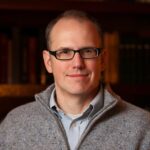

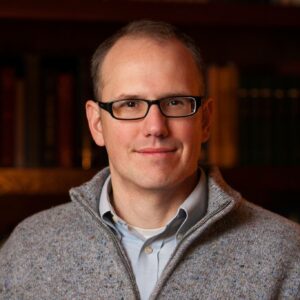
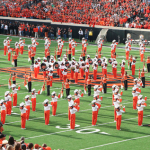
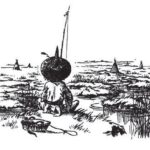
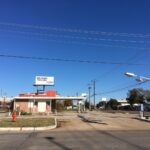
1 comment
Phil Brodersen
Clear and insightful thoughts well presented. Thanks Ben.
Phil
Comments are closed.